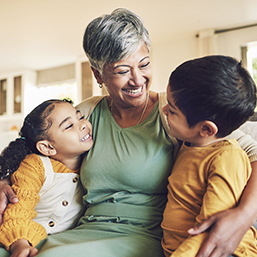
Becoming a grandparent is a magical experience.
\nAfter decades of learning about yourself and navigating the journey of parenthood through successes, challenges, mistakes, and growth, you have gained a wealth of real life experience in raising a child. Now, you get to witness your own child embark on the same journey. This intergenerational transition is both incredible and deeply meaningful.
\n \nYou may notice small gestures, traditions, and routines that have been passed down without any prompting, like a familiar lullaby being sung or a bedtime story you once read now being shared with your grandchild. Seeing these echoes of your parenting reflected in the next generation can be heartwarming and powerful. But, you may also observe differences.
\nYour adult child may be adopting new strategies, following new parenting research, or taking a different approach than you did. These methods may seem counterintuitive or unfamiliar to you. It’s natural to compare your own parenting experiences with theirs and wonder, “Why would I want them to make the same mistakes that I did?”
\nDr. Daniel Amen, a renowned celebrity psychiatrist, discusses in his book Raising Mentally Strong Kids the importance of allowing children to fail. While parents strive to set their children up for success, it is equally important to let them face developmentally appropriate setbacks. These experiences help build resilience, encourage problem-solving, and foster confidence in overcoming challenges. What if the same principle applies to parenting itself? Maybe allowing your adult child to make their own parenting choices, navigate their own challenges, and learn from their own experiences can create mentally strong parents as well. Let your adult children have their own unique parenting journey. It’s a part of the growth process.
\nSo, when is it okay to offer your own parenting opinions as a grandparent? The key takeaway here is to refrain from offering unsolicited parenting advice. Even if you believe you have the perfect solution to a challenge your child is facing and you may be screaming, “I told you so!” internally when you see the outcome, giving unsolicited input can strain relationships. It can also create defensiveness, reduce parental confidence, and can feel judgmental instead of helpful.
\nHowever, being a supportive grandparent doesn’t mean staying silent or disengaged. It means creating a balance between offering guidance and fostering a positive, respectful connection. So, how can you support your adult child while maintaining a strong relationship with both them and your grandchild? The answer is simple yet nuanced: Be a safe space. Offer support through conversation rather than unsolicited advice. What does this look like?
\n1. Ask first. Instead of jumping in with advice, ask if they would like input: "Would you like my thoughts on this?"
\n2. Listen first, advise later. Sometimes, people just need to vent. Listening without trying to fix it can be more valuable than giving advice.
\n3. Respect autonomy. Even if you believe you have the right answer, allow people to make their own choices and learn from their experiences.
\n4. Offer perspective, not directives. Instead of saying, "You should do this," try saying, "Here’s something that worked for me. What do you think?"
\nBy shifting from unsolicited advice to supportive conversations, you can strengthen your relationship with your adult child, build trust, and create an open and understanding dynamic. In the end, your role as a grandparent is not just to impart wisdom, but to be a loving, reassuring presence in their parenting journey.
\n\n
Joanna and Lara (Registered Psychologist and Child Mental Health Advocate) started Psyched About Kids (PAK) in 2016 because they are obsessed with human potential! PAK empowers parents with science-backed knowledge, strategies and tools to solve our most pressing parenting issues today and make life a little easier, along with ongoing support to implement the desired change. Small actions over time can have an unimaginable impact on child growth and development for lifelong health and wellness. Learn more at psychedaboutkids.com.
\n\n
See our related articles:
\nCalgary’s Child Magazine © 2025 Calgary’s Child